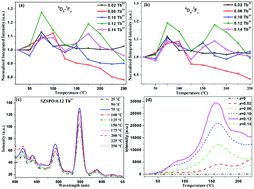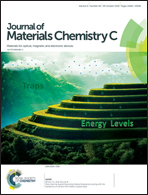Zero-thermal-quenching and photoluminescence tuning with the assistance of carriers from defect cluster traps†
Abstract
Thermal quenching is a serious limiting factor for high-power phosphor-converted white-light-emitting diodes (pc-WLEDs) due to the temperature increase that results in emission loss by non-radiative transitions. Herein, we report new Tb3+-doped Sr8ZnSc(PO4)7 phosphors with zero-thermal-quenching and tunable photoluminescence behaviors. As verified by thermoluminescence (TL) spectra, the carriers captured by shallow traps were transferred to 5D3 energy level of Tb3+, compensating the inhibition on blue 5D3 → 7FJ emissions from the increasing concentration (x) of Tb3+; therefore, the emission color was tuned from bright blue (0.205, 0.186) to white (0.215, 0.273) and finally to bright green (0.245, 0.411) upon 370 nm UV excitation as a function of x. In addition, the zero-thermal-quenching behavior at high temperatures up to 225 °C benefited from the carriers captured by deeper traps. Thus, the reported Sr8ZnSc(PO4)7:xTb3+ phosphors may be candidates for high-power pc-WLEDs.



 Please wait while we load your content...
Please wait while we load your content...